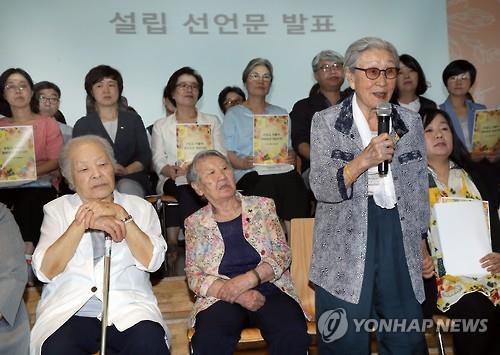- California Assembly OKs highest minimum wage in nation
- S. Korea unveils first graphic cigarette warnings
- US joins with South Korea, Japan in bid to deter North Korea
- LPGA golfer Chun In-gee finally back in action
- S. Korea won’t be top seed in final World Cup qualification round
- US men’s soccer misses 2nd straight Olympics
- US back on track in qualifying with 4-0 win over Guatemala
- High-intensity workout injuries spawn cottage industry
- CDC expands range of Zika mosquitoes into parts of Northeast
- Who knew? ‘The Walking Dead’ is helping families connect
Victims of Japanese sexual slavery launch independent foundation

A South Korean victim of Japan’s wartime sexual slavery Kim Bok-dong speaks during a press conference on the establishment of the private Foundation for Justice and Remembrance of the Issue of Military Sexual Slavery by Japan in western Seoul on June 9, 2016. The new foundation denounced a Seoul-Tokyo deal reached in December to end decades-old disputes over the wartime atrocities. In the agreement, Japan agreed to inject 1 billion yen (US$8.98 million) into a South Korean government-led foundation as part of compensation measures.
SEOUL, (Yonhap) — South Korean victims of Japan’s wartime sexual slavery launched a private foundation Thursday, denouncing the landmark agreement reached by Seoul and Tokyo last year.
The Foundation for Justice and Remembrance for the Issue of Military Sexual Slavery by Japan held its establishment ceremony in western Seoul, vowing to support the victims and continue research on the issue.
The move came a week after the South Korean government launched a preparatory committee to establish a foundation aimed at compensating the victims who were forced to serve in frontline brothels for the imperialist Japanese army during World War II.
It was the first official step to implement the agreement reached between the South Korean and Japanese governments to end decades-old disputes over the wartime atrocities.
In the agreement, Japan pledged to inject 1 billion yen (US$8.98 million) into the foundation as part of compensation measures.
Many of the alive victims, represented by the Korean Council for the Women Drafted for Military Sexual Slavery by Japan, have been opposed to the deal, and have been calling for legal compensation from the Japanese government.
Historians estimate that up to 200,000 women, mostly from Korea, were victims of such sexual slavery during that war era. The issue is becoming increasingly urgent as most victims are well over 80 years old and may die before they receive compensation or an apology from Japan.











